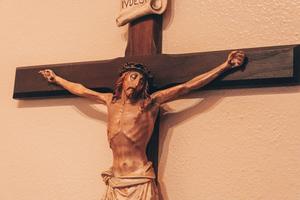Counting the Cost of Condemnation
User's Guide to the Fifth Sunday of Lent

Sunday, April 3, is the Fifth Sunday of Lent. Mass readings: Isaiah 43:16-21; Psalm 126:1-2, 2-3, 4-5, 6; Philippians 3:8-14; and John 8:1-11.
Today’s Mass features the well-known Gospel of the woman caught in adultery. In it, the Lord reminds the men of his day that the severe punishment they want to mete out to this woman may be unwise, given that they themselves must prepare for their own judgment.
We need to be sober about this. We are storing up things for the Day of Judgment by the way we treat others. Because we are all going to need so much mercy and because we cannot endure strict standards of judgment, we should consider carefully the need to be merciful and forgiving to others.
Collaborators in Condemnation
The Pharisees and the teachers of the law bring forward a woman caught in the act of adultery. They want to “throw the book” at her. They want the strictest punishment meted out: stoning. This is unwise because by demanding harsh punishment for others we set ourselves up to be judged by the same strict standard. The Lord says, “For with the measure you use, it will be measured to you” (Luke 6:38). It’s always a better policy to cry for grace and the conversion of sinners.
Counting the Cost
As God, Jesus knows the sins of all the men gathered. He must be amazed; surely, they cannot be serious in demanding such a harsh punishment for the woman knowing that the day of their own judgment awaits! Jesus bends down and traces his finger on the ground, almost as if he is writing down their sins.
These Pharisees are slow to understand, so Jesus reasons with them, saying, “Let him among you who is without sin cast the first stone.” It is as though Jesus were saying, “Reason with me, men. If you demand strict justice, if you insist that I ‘throw the book’ at her, you’d better first look and see what is written about you in ‘the book.’ If she is to be judged strictly and without mercy, then you, too, will face the same standard. Think about it. Think very carefully.”
One by one, they go away. The measure that we measure out to others will be the measure or standard God uses for us. What kind of judgment are you preparing for yourself? Condemnation comes at a high cost. Remember your upcoming judgment. Be like the wise person, who knows he will need grace and mercy on that day because he will not be able to withstand a strict adjudication of his crimes.
Correcting With Compassion
The departure of the accusers leaves Jesus alone with the woman. Though he speaks gently, Jesus is clear: “‘Woman, where are they? Has no one condemned you?’ She replied, ‘No one, sir.’
Then Jesus said, ‘Neither do I condemn you. Go, and from now on do not sin anymore.’” This Gospel, therefore, does not make light of the woman’s sin.
Jesus knows what she has done, and so does she. He is clear that she must turn away from sin; she must not commit it anymore.
What Jesus does set aside is the condemning “hang-’em-high” mentality that seeks the harshest measures for every situation. Yes, we must sometimes correct sinners and mete out punishment. But before rushing to extreme measures, we do well to show mercy and to attempt lesser corrections first.
So, count the cost. Be very careful to remember that the measure you measure out to others will be measured out to you. Blessed are the merciful, for they shall obtain mercy (Matthew 5:7).
- Keywords:
- msgr. charles pope
- user’s guide to sunday
- user's guide to sunday
- fraternal correction
- mercy of god














